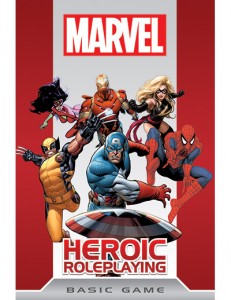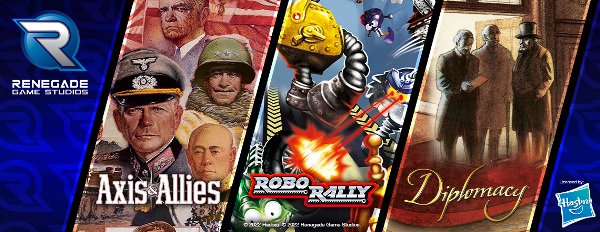Brand Recognition
By The Warden
 Discouraging news dominated the blogosphere this week and I can’t help but feel angry. Perhaps anger might be too strong a word (not that I’m inclined to repress anger, but it’s not entirely appropriate as time passes since the initial announcement), but disappointment is holding the rest of my emotions at the podium. And hindsight has taken the microphone for this week’s edition of UtH.
Discouraging news dominated the blogosphere this week and I can’t help but feel angry. Perhaps anger might be too strong a word (not that I’m inclined to repress anger, but it’s not entirely appropriate as time passes since the initial announcement), but disappointment is holding the rest of my emotions at the podium. And hindsight has taken the microphone for this week’s edition of UtH.
On Thursday, Margaret Weis Productions announced the near-immediate cancelation of the Marvel Heroic Roleplaying game due to the simple fact that they couldn’t afford to keep the license. The demands of Marvel Entertainment (or whichever actual brand of the Marvel Corporate Universe was involved) were more than sales of 2012’s flagship release. Not only will all PDF sales of the Marvel RPG conclude in just a couple of days, but they had to cancel the much-anticipated supplement, Annihilation, and promise to refund all pre-orders.
Wow.
It’s a real shame that this incredible game will no longer continue to thrive and impress new and experienced, young and old players alike for many years to come (though it’s not like we’re all forbidden from playing the game for the remainder of the genre’s lifespan). That was my first reaction and five seconds later, I was reminded of an eventuality. It was bound to happen sooner or later.
INEVITABILITY
The announcement of a cancelled license is a bit of a specialty for MWP. The Marvel RPG license is the second cancelled license for 2013 and it’s only the end of April. Add to that the procurement of the Firefly RPG license, picking up where the cancelled Serenity RPG license left off, and add to it a rather lengthy list of other formerly successful lines pulled in their prime (cough, Smallville!!). And that wasn’t the only licensing announcement given this week; Cubicle 7 has bragging right for the Lone Wolf setting by Joe Dever, a deal formerly arranged with Mongoose Publishing until that duo went their separate ways.
It was only a matter of time before we had to part ways with the Marvel Heroic RPG. We all knew it. The publisher/player relationship with a licensed product is much like a long distance relationship between childhood sweethearts. Deep down, we all know it’s going to come to an end. Even if we can never admit it during the relationship. Most licenses work on a strict product count, typically a core rulebook and up to 3 additional supplements, before the license comes up for renewal. In that time, the costs and procedures involve make the process more complex than an original product line. (You can travel back in time and read License to Game dealing with this issue back in March of last year.)
Times like this make it seem like all that work is for nothing, except for the fact that these games never truly die. Maybe as far as Marvel’s concerned, there is no longer a tabletop roleplaying game with their brand on it, but we know better. Whenever anyone talks to me about the Marvel RPG, I’m always asked to clarify between TSR’s version and MWP’s entry because both still exist in various circles around the world. They don’t remember or particularly care that Marvel pulled the plug for whatever reason, only that the RPG publisher took a shot and made it happen. That’s publisher loyalty and it’s unlocked when said publisher can no longer keep pace with the gigantic corporations embodied by Marvel and other significant copyrighted property holders. We know it’s not their fault and if they could have had a chance, they could have gone on to make one of the greatest RPG lines ever, leading us to run memorial games and keep its spirit alive on forums, blogs, and annual deserted island lists. In that way, the outcome was definitely worth the effort.
Assuming, of course, a publisher can outlast the financial risks involved with licensing. West End Games went from one of the industry’s leading publishers of successfully licensed and exciting RPGs to bankruptcy after losing the Star Wars and Ghostbusters licenses. In an effort to continue riding their momentum, WEG potentially sunk their reserves (as there is no concrete evidence pointing to this factor) into RPGs such as Men In Black, the Hercules and Xena TV series, and Tales From the Crypt all the way into obscurity.
GROWTH FROM DEATH
There’s another important benefit to the risk of licensing. Many licensed RPGs are released using a new and unique system sponsored by the publisher, such as WEG’s d6 system and MWP’s Cortex Plus system. The licensed material – be it the X-wings and lightsabers or muscular superheroes – unlocks this system to a wider audience, particularly those who may not have tried RPGs without the licensing. As experienced RPG fans, we may take for granted the impact of a game’s mechanics on our gaming experiences because we’re already fans of the genre. The fact that we have access to “officially” play with our favourite characters is just a bonus. Newcomers don’t have that impression because they don’t have our experiences. When they try out something like the Marvel RPG for the first time, they’re focused on playing the part of their favourite superhero and whether or not they could believe the fantasy during play. They have nothing else to compare their experience to and so will learn about the game through their immediate reactions of joy or frustration. Should they become interested in other RPGs, their future experiences will be drawn from and compared to their immediate reactions using that otherwise unknown system. While those of us who grew up playing RPGs from its early days draw our experiences and concepts of game mechanics from classics like D&D, these new players will have a different scale to work from in the next generation of roleplayers. As a whole, that’s a win-win situation.
This provides ample opportunity for the rejected publisher to capitalize on the success of the now-cancelled game through the system empowering it. “Did you like playing Spider-Man in our Marvel RPG? Then you’re going to love being a Spartan in our 300 RPG!!” Because just like people in long distance relationships, we’re hopeless romantics. The problem wasn’t in the relationship, it was the wrong pairing, that’s all. This one is going to work better. We just know it.
And we’re back to that feeling of disappointment; working together with anger and hindsight to figure out what’s bothering us about this whole situation. Publishers of licensed products are almost always exclusively publishers of licensed products. They never dabble in it and step away after their first foray; they try it again. Sure, there may be some non-licensed product lines in their catalogue (Freeport from Green Ronin, for example, who is another major publisher of licensed games), but once these publishers lose one license, they’re gearing up for another. In the case of MWP in particular, I wonder if it’s finally time for them to branch into something a little more original. And there may be a way to do without entering unfamiliar territory.
Simply license one of Margaret Weis’ many novels and setting. I’m sure there’s a couple dozen in there ripe for the plucking and the chances of the author pulling the plug on that deal is pretty slim.


